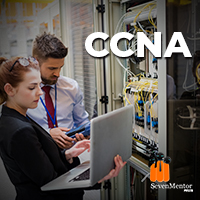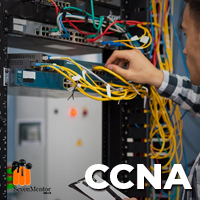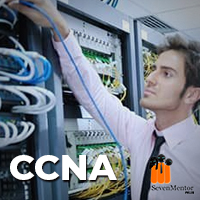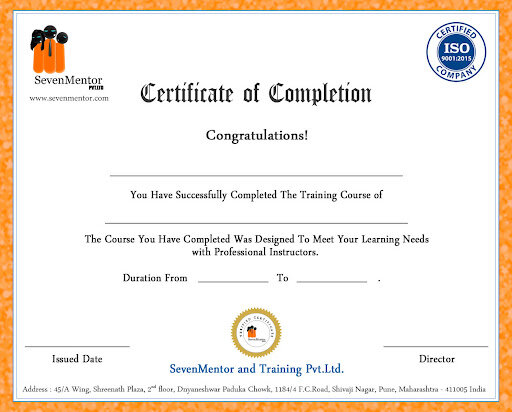CCNA
If you choose a pre-existing market, such as networking equipment, you will have to compete with a well-established corporation such as Cisco. Even if your product is somewhat superior, Cisco can outsell you.
Call The Trainer
Batch Timing
- Regular: 2 Batches
- Weekends: 2 Batches
Request Call Back
Class Room & Online Training Quotation
About CCNA
CCNA course in Odisa are one of the world's most popular networking courses. It is supplied by CISCO, a well-known network equipment vendor. This course prepares applicants for the real world by providing them with academic knowledge as well as practical networking training. Various Institute’s provide CCNA courses in Odisa while keeping excellent training and learning standards. The certification is only valid for three years. You must renew it every three years to keep it current. Candidates who have passed the CCNA exam can connect to remote locations over a wide area network (WAN), mitigate significant system security threats, and comprehend basic systems administration ideas and terminology. This course is suitable for anyone interested in working in networking.
CCNA Training in Odisa Certified Professionals: Job Opportunities
The CCNA Course provides comprehensive knowledge of numerous networking technologies. As a result, after completing the CCNA Certification Training in Odisa, one will be able to find a variety of work options. Some of them are as follows:
Network Administrator, Network Engineer Network and Technical Support System Engineer Technician Field Engineer Network Designer Network Planner Network Implementer Network Optimizer
Executive Network Support Security Specialist Security Administrator Support Engineer
Technician for Video
Video operators
The CCNA Classes in Odisa Can Help You Earn a Job
The Cisco CCNA (also known as the Cisco Certified Network Associate) is a Cisco certification created as an advanced entry-level (or associate level) designation that displays proficiency in layer 2 and layer 3 switching and routing theories and how they relate to Cisco appliances. The Cisco CCNA Training in Odisa has been around for a while.
What Is The Purpose Of The CCNA Exam?
Cisco's Cisco Certified Network Associate (CCNA) certification is one of the company's most sought-after IT certifications. The Cisco CCNA exam is divided into two modules that examine network basics and skills such as LAN switching, IP routing technologies, WAN protocols, and configuration regularities required in a big enterprise using Cisco equipment. Cisco CCNA Classes in Odisa certified professionals can set up Cisco routers and switches in small, medium, and large enterprise settings.
The Cisco Certified Network Associate (CCNA) Course in Odisa certification is intended for IT professionals who want to enhance their careers as network technicians or engineers by learning skills that can be applied to a wide range of network equipment. The Cisco 200-301 exam is a 120-minute test that can be taken in either English or Japanese. It is possible to break it down as follows: It will test your knowledge and skills in configuring, verifying, and troubleshooting fundamental routing using several routing protocols, including static IP/VPN/DMZ routing. BGP; vRouter; dynamic routing protocols (RIPv1 and RIPv2); OSPF V3; configuring and validating EIGRP; and configuring and verifying multi-area OSPF will be covered. Access to the network (20%): This exam will also assess students' knowledge of VLANs, Interswitch connectivity, Layer 2 discovery protocols, and EtherChannel; Rapid Spanning Tree Protocol operations; Cisco wireless architectures, AP modes, physical WLAN elements, AP and WLC supervision entry connections, and wireless LAN access.
Network access -
Students will be tested on their ability to configure and troubleshoot VLANs, Interswitch connectivity, Layer 2 discovery protocols, and EtherChannel; Rapid Spanning Tree Protocol operations; Cisco wireless architectures, AP methods, real WLAN elements, AP and WLC management entry associations, and wireless LAN permit.
Routers, switches, and access points; network architecture designs; physical interfaces and cabling kinds; IP4/IPv6 setup; IP parameters; wireless fundamentals, virtualization principles (20%)
Identity management and access control, data centre security policies, physical access control, password rules, access control lists, Layer 2 security features, and wireless transmission protocols are all examples of security foundations (15 percent).
Identity management and access control, data centre security policies, physical access control, password rules, access control lists, Layer 2 security features, and wireless transmission protocols are all examples of security fundamentals (15%).
IP services (10% of total): Configuring and validating NAT and NTP; describing DHCP, DNS, SNMP, and Syslog functionality; per-hop behaviour; using SSH, and describing TFTP/FTP
Automation and programmability (10% of the total): to contrast traditional networks with controller-based networks, automation concepts, and JSON data interpretation
How Much Money Can I Make With a CCNA Training Certificate?
Cisco Certified Network Associate (CCNA) is a Cisco certification that verifies network administration knowledge and skills. Individuals with this credential may expect to earn an annual salary of $80,000 on average.
Cisco-certified experts are widely sought after by employers and other IT firms since they have demonstrated their expertise.
How to Obtain the CCNA Certification
Cisco Certified Network Associate (CCNA) Cisco's certification programme is extremely popular among IT professionals. The CCNA certification opens doors to various opportunities in the IT sector, including working as an entry-level network administrator or engineer for one of the more than 500 organisations that hire Cisco certified experts.
You must pass the Cisco 200-301 exam to acquire the CCNA certification.
Why do you require CCNA?
Additional Cisco Courses will help you whether you wish to apply for a new job or advance in your existing workplace. Cisco training and certification are the most dependable ways to demonstrate your IT abilities. If you have a new employment, you can increase your points by obtaining the CCNA certification in Odisa. The majority of interview judgments are made based on the very minimum of information available on your CV. Obtaining a Cisco certification will surely increase your competitiveness.
Professionals with the Cisco CCNA certification can gain a better understanding of network principles. Assist network specialists in keeping their current skills and knowledge up to speed. It can help you advance in your profession, get a promotion, and find new employment prospects with higher pay. Employers, on the other hand, turn your new qualification into benefits that they can obtain from it. Ultimately, this permits you to advance within the same organisation and obtain a higher position. The CCNA is your key to accelerating your career development and propelling it to the next level. There are numerous other Cisco certificates, including professional and expert levels, but we'll start here.
Progress in one's career
If you are a seasoned applicant, CCNA certification will help you advance in your career. In addition, whether you wish to change careers or are a beginning, the networking business provides numerous professional growth options. Governments and other businesses are looking for experienced network engineers to oversee network operations due to the rapid advancement of technology.
Increased Salary and Benefits
If you're looking for a company with a higher position firm and are expecting an appraisal soon, this could be your chance to nail it. The proper time is very important for CCNA certification. If you choose it now, you will receive a better job, higher pay, and other perks. CCNA is an incredible achievement to have on your resume.
Excellent Acceptance
Cisco is a household name in the information technology industry. Not only is it well-known for its extensive platform, but its distinctive characteristics make it simple for IT to conduct business. Anyone who has been trained and certified to use the platform and its features will be given preference among candidates. Once qualified, you can include your certification on your CV to demonstrate your technical expertise in the use of complicated network models. Furthermore, applying for a position in Cisco's networking area improves your chances of success. Because the industry is always changing, the accreditation is only valid for three years. That implies you must seize the best opportunity available during this time and make the most of it.
Presence on your Team
Obtaining a Cisco certification will help you advance in the eyes of your colleagues and coworkers. Obtain acknowledgment and respect. This significance places you in a position of leadership and opens up new avenues for advancement in the IT business.
International acclaim
Cisco certification is recognised in countries all over the world. Networking professionals who have received CCNA classes in Odisa are more qualified to charge greater service rates than professionals who have not received CCNA certification. The IT department can now give numerous opportunities for CCNA-certified workers. The CCNA certification classes in Odisa is the gold standard for landing a job.
A Step of Mediation
Many other Cisco certifications require passing the CCNA exam before proceeding with the Cisco curriculum. If you have a valid CCNA credential, you are entitled to join other classes.
What qualifications are necessary for CCNA?
The CCNA exam does not have any requirements. That is, you do not need to take any previous exams in order to achieve CCNA certification. However, before beginning CCNA certification training, it is a good idea to learn the foundations of networking. If you have prior IT experience and want to begin a career in networking, you should enrol in a CCNA certification course to enhance your abilities and knowledge.
Online Classes
The Online CCNA Classes in Odisa is an important Course that will help you advance in your career. It aids in the advancement of the networking area. Individuals and students who want to learn about technological advances can enrol in our Online CCNA training in Odisa. The best instructors at SevenMentor & Training Pvt. Ltd train and mentor candidates to a successful career. Students can enrol in an Online CCNA course in Odisa to help them achieve their career objectives.
Course Eligibility
There is no such criteria for joining Online CCNA Training. CCNA is an associate or entry level certification exam for those who are planning to build their career in the most demanding field of networking.
- 10+2 students can go for CCNA Training
- Undergraduates and graduates
- Professionals who want switch
- Those who are interested in Networking
Syllabus of CCNA
Cisco Certified Network Associate (200-301)
Exam Description: The Cisco Certified Network Associate (CCNA) Routing
and Switching composite exam (200-301) is a 90-minute, 50–60 question
assessment that is associated with the CCNA Routing and Switching
certification. This exam tests a candidate's knowledge and skills related to
network fundamentals, LAN switching technologies, IPv4 and IPv6 routing
technologies, WAN technologies, infrastructure services, infrastructure
security, and infrastructure management .The following topics are general guidelines for the content likely to be
included on the exam. However, other related topics may also appear on any
specific delivery of the exam. In order to better reflect the contents of the
exam and for clarity purposes, the guidelines below may change at any time
without notice.
15% 1.0 Network Fundamentals
21% 2.0 LAN Switching Technologies
23% 3.0 Routing Technologies
10% 4.0 WAN Technologies
10% 5.0 Infrastructure Services
11% 6.0 Infrastructure Security
10% 7.0 Infrastructure Management
- 1.0 Network Fundamentals
- 1.1. Compare and contrast OSI and TCP/IP models
- 1.2. Compare and contrast TCP and UDP protocols
- 1.3. Describe the impact of infrastructure components in an enterprise network
- 1.3.1. Firewalls
- 1.3.2. Access points
- 1.3.3. Wireless controllers
- 1.4. Describe the effects of cloud resources on enterprise network architecture
- 1.4.1. Traffic path to internal and external cloud services
- 1.4.2. Virtual services
- 1.4.3. Basic virtual network infrastructure
- 1.5. Compare and contrast collapsed core and three-tier architectures
- 1.6. Compare and contrast network topologies
- 1.6.1. Star
- 1.6.2. Mesh
- 1.6.3. Hybrid
- 1.7. Select the appropriate cabling type based on implementation requirements
- 1.8. Apply troubleshooting methodologies to resolve problems
- 1.8.1. Perform and document fault isolation
- 1.8.2. Resolve or escalate
- 1.8.3. Verify and monitor resolution
- 1.9. Configure, verify, and troubleshoot IPv4 addressing and subnetting
- 1.10. Compare and contrast IPv4 address types
- 1.10.1. Unicast
- 1.10.2. Broadcast
- 1.10.3. Multicast
- 1.11. Describe the need for private IPv4 addressing
- 1.12. Identify the appropriate IPv6 addressing scheme to satisfy< addressing requirements in a LAN/WAN environment
- 1.13. Configure, verify, and troubleshoot IPv6 addressing
- 1.14. Configure and verify IPv6 Stateless Address Auto Configuration
- 1.15. Compare and contrast IPv6 address types
- 1.15.1. Global unicast
- 1.15.2. Unique local
- 1.15.3. Link local
- 1.15.4. Multicast
- 1.15.5. Modified EUI 64
- 1.15.6. Autoconfiguration
- 1.15.7. Anycast
- LAN Switching Technologies
- 2.1. Describe and verify switching concepts
- 2.1.1. MAC learning and aging
- 2.1.2. Frame switching
- 2.1.3. Frame flooding
- 2.1.4. MAC address table
- 2.2. Interpret Ethernet frame format
- 2.3. Troubleshoot interface and cable issues (collisions, errors, duplex, speed)
- 2.4. Configure, verify, and troubleshoot VLANs (normal/extended range) spanning multiple switches
- 2.4.1. Access ports (data and voice)
- 2.4.2. Default VLAN
- 2.5. Configure, verify, and troubleshoot interswitch connectivity
- 2.5.1. Trunk ports
- 2.5.2. Add and remove VLANs on a trunk
- 2.5.3. DTP, VTP (v1&v2), and 802.1Q
- 2.5.4. Native VLAN
- 2.6. Configure, verify, and troubleshoot STP protocols
- 2.6.1. STP mode (PVST+ and RPVST+)
- 2.6.2. STP root bridge selection
- 2.7. Configure, verify and troubleshoot STP related optional features
- 2.7.1. PortFast
- 2.7.2. BPDU guard
- 2.8. Configure and verify Layer 2 protocols
- 2.8.1. Cisco Discovery Protocol
- 2.8.2. LLDP
- 2.9. Configure, verify, and troubleshoot (Layer 2/Layer 3) EtherChannel
- 2.9.1. Static
- 2.9.2. PAGP
- 2.9.3. LACP
- 2.10. Describe the benefits of switch stacking and chassis aggregation
- 3.0 Routing Technologies
- 3.1. Describe the routing concepts
- 3.1.1. Packet handling along the path through a network
- 3.1.2. Forwarding decision based on route lookup
- 3.1.3. Frame rewrite
- 3.2. Interpret the components of a routing table
- 3.2.1. Prefix
- 3.2.2. Network mask
- 3.2.3. Next hop
- 3.2.4. Routing protocol code
- 3.2.5. Administrative distance
- 3.2.6. Metric
- 3.2.7. Gateway of last resort
- 3.3. Describe how a routing table is populated by different routing information sources
- 3.3.1. Admin distance
- 3.4. Configure, verify, and troubleshoot inter-VLAN routing
- 3.4.1. Router on a stick
- 3.4.2. SVI
- 3.5. Compare and contrast static routing & dynamic routing
- 3.6. Compare and contrast distance vector and link state routing protocols
- 3.7. Compare and contrast interior and exterior routing protocols
- 3.8. Configure, verify, and troubleshoot IPv4 and IPv6 static routing
- 3.8.1. Default route
- 3.8.2. Network route
- 3.8.3. Host route
- 3.8.4. Floating static
- 3.9. Configure, verify, and troubleshoot single area and multi-area OSPFv2 for IPv4 (excluding authentication, filtering, manual summarization, redistribution, stub, virtual-link, and LSAs)
- 3.10. Configure, verify, and troubleshoot single area and multi-area OSPFv3 for IPv6 (excluding authentication, filtering, manual summarization, redistribution, stub, virtual-link, and LSAs)
- 3.11. Configure, verify, and troubleshoot EIGRP for IPv4 (excluding authentication, filtering, manual summarization redistribution, stub)
- 3.12. Configure, verify, and troubleshoot EIGRP for IPv6 (excluding authentication, filtering, manual summarization redistribution, stub)
- 3.13. Configure, verify, and troubleshoot RIPv2 for Ipv4 (excluding authentication, filtering manual summarization, redistribution)
- 3.14. Troubleshoot basic Layer 3 end-to-end connectivity issues
- 4.0 WAN Technologies
- 4.1. Configure and verify PPP and MLPPP on WAN interfaces using local authentication
- 4.2. Configure, verify, and troubleshoot PPPoE client-side interfaces using local authentication
- 4.3. Configure, verify, and troubleshoot GRE tunnel connectivity
- 4.4. Describe WAN topology options
- 4.4.1. Point-to-point
- 4.4.2. Hub and spoke
- 4.4.3. Full mesh
- 4.4.4. Single vs dual-homed
- 4.5. Describe WAN access connectivity options
- 4.5.1. MPLS
- 4.5.2. Metro Ethernet
- 4.5.3. Broadband PPPoE
- 4.5.4. Internet VPN (DMVPN, site-to-site VPN, client VPN)
- 4.6. Configure and verify single-homed branch connectivity using eBGP IPv4 (limited to peering and route advertisement using Network command only)
- 4.7. Describe basic QoS concepts
- 4.7.1. Marking
- 4.7.2. Device trust
- 4.7.3. Prioritization
- A. Voice
- B. Video
- C. Data
- 4.7.4. Shaping
- 4.7.5. Policing
- 4.7.6. Congestion management
- 5.0 Infrastructure Services
- 5.1. Describe DNS lookup operation
- 5.2. Troubleshoot client connectivity issues involving DNS
- 5.3. Configure and verify DHCP on a router (excluding static reservations)
- 5.3.1. Server
- 5.3.2. Relay
- 5.3.3. Client
- 5.3.4. TFTP, DNS, and gateway options
- 5.4. Troubleshoot client- and router-based DHCP connectivity issues
- 5.5. Configure, verify, and troubleshoot basic HSRP
- 5.5.1. Priority
- 5.5.2. Preemption
- 5.5.3. Version
- 5.6. Configure, verify, and troubleshoot inside source NAT
- 5.6.1. Static
- 5.6.2. Pool
- 5.6.3. PAT
- 5.7. Configure and verify NTP operating in a client/server mode
- 6.0 Infrastructure Security
- 6.1. Configure, verify, and troubleshoot port security
- 6.1.1. Static
- 6.1.2. Dynamic
- 6.1.3. Sticky
- 6.1.4. Max MAC addresses
- 6.1.5. Violation actions
- 6.1.6. Err-disable recovery
- 6.2. Describe common access layer threat mitigation techniques
- 6.2.1. 802.1x
- 6.2.2. DHCP snooping
- 6.2.3. Nondefault native VLAN
- 6.3. Configure, verify, and troubleshoot IPv4 and IPv6 access list for traffic filtering
- 6.3.1. Standard
- 6.3.2. Extended
- 6.3.3. Named
- 6.4. Verify ACLs using the APIC-EM Path Trace ACL Analysis tool
- 6.5. Configure, verify, and troubleshoot basic device hardening
- 6.5.1. Local authentication
- 6.5.2. Secure password
- 6.5.3. Access to device
- A. Source address
- B. Telnet/SSH
- 6.5.4. Login banner
- 6.5.5. Describe device security using AAA with TACACS+ and RADIUS
- 7.1. Configure and verify device-monitoring protocols
- 7.1.1. SNMPv2
- 7.1.2. SNMPv3
- 7.1.3. Syslog
- 7.2. Troubleshoot network connectivity issues using ICMP echo-based IP SLA
- 7.3. Configure and verify device management
- 7.3.1. Backup and restore device configuration
- 7.3.2. Using Cisco Discovery Protocol or LLDP for device discovery
- 7.3.3. Licensing
- 7.3.4. Logging
- 7.3.5. Timezone
- 7.3.6. Loopback
- 7.4. Configure and verify initial device configuration
- 7.5. Perform device maintenance
- 7.5.1. Cisco IOS upgrades and recovery (SCP, FTP, TFTP, and MD5 verify)
- 7.5.2. Password recovery and configuration register
- 7.5.3. File system management
- 7.6. Use Cisco IOS tools to troubleshoot and resolve problems
- 7.6.1. Ping and traceroute with extended option
- 7.6.2. Terminal monitor
- 7.6.3. Log events
- 7.6.4. Local SPAN
- 7.7. Describe network programmability in enterprise network architecture
- 7.7.1. Function of a controller
- 7.7.2. Separation of control plane and data plane
- 7.7.3. Northbound and southbound APIs
Trainer Profile of CCNA
At SevenMentor, you can take either the teacher drove online training or classroom training. Aside from this, SevenMentor additionally offers corporate training for associations to upskill their workforce. All mentors at SevenMentor have a years important industry experience, and they have been effectively functioning as advisors in a similar space, which has made them topic specialists. You can have a demo lecture to check the quality of our trainers.
- Certified Professionals with more than 8+ Years of Experience
- Trained more than 2000+ students in a year
- Strong Theoretical & Practical Knowledge in their domains
- Expert level Subject Knowledge and fully up-to-date on real-world industry applications
CCNA Exams & Certification
SevenMentor Certification is Accredited by all major Global Companies around the world. We provide after completion of the theoretical and practical sessions to fresher’s as well as corporate trainees.
Our certification at SevenMentor is accredited worldwide. It increases the value of your resume and you can attain leading job posts with the help of this certification in leading MNC’s of the world. The certification is only provided after successful completion of our training and practical based projects.
Proficiency After Training
- Describe how Components Operate, identifying Important Elements, a function of network Elements, as well as the OSI reference model
- Employing the host-to-host Parcel delivery process, Clarify Problems related to increasing traffic on an Ethernet LAN and identify Changed LAN technology Alternatives into Ethernet networking Problems
- Describe the reasons for Expanding the reach of a LAN as well as the methods Which Can Be Utilized, with a focus on RF wireless Accessibility
- Explain the reasons for Linking networks Using routers and the Way routed networks transmit Information via networks using TCP / IP
- Explain the Use of WANs, the Significant Apparatus of WANs, Also configure PPP encapsulation, static and dynamic routing, PAT, and RIP routing
- Utilize the command-line Port to Detect neighbors on the Community and manage the router startup and Configuration
Key Features
Skill level
From Beginner to Expert
We are providing Training to the needs from Beginners level to Experts level.
Course Duration
12 weeks
Course will be 90 hrs to 110 hrs duration with real-time projects and covers both teaching and practical sessions.
Total Learners
2000+ Learners
We have already finished 100+ Batches with 100% course completion record.
Frequently Asked Questions
Batch Schedule
Students Reviews
Several of the most intriguing classes I've ever taken. Trainers were quite helpful and provided excellent teaching. My career path had completely baffled me. Energetic positive atmosphere.
- Ishita Naik
The CCNA course from SevenMentor was excellent. Excellent practice sessions aided me in widening my understanding. SevenMentor Institute, thank you so much.
- Nitesh Rana
It's a laid-back atmosphere. Classes that are stable and easy to understand. Not only did I learn new skills, but I also made great developments in my skills.
- Aditya Sontakke
Course video & Images



Corporate Training
SevenMentor & Training Pvt. Ltd's Corporate CCNA training in Odisa is not limited to one. Those with prior experience can enrol in a Corporate CCNA Course in Odisa and improve skills quickly. SevenMentor & Training Pvt. Ltd offers both classroom training and on-the-job mentoring. As a result, those who have registered will be able to get recruited or perform well in their respective firms.
Our Placement Process

Eligibility Criteria

Placements Training

Interview Q & A

Resume Preparation

Aptitude Test

Mock Interviews

Scheduling Interviews

Job Placement

Related Courses
Have a look at all our related courses to learn from any location
CCNA Security class is the greatest training tool for engineers following the Cisco Certified Network Associate Security (CCNA Security) certification.
The CCNP Certification is just one among the vital certifications from Cisco a media professional must want to proceed in his profession.
An Advanced level in cisco certification-networking training is intended for professionals with prior experience in the networking field.
Request For Call Back
Class Room & Online Training Quotation

